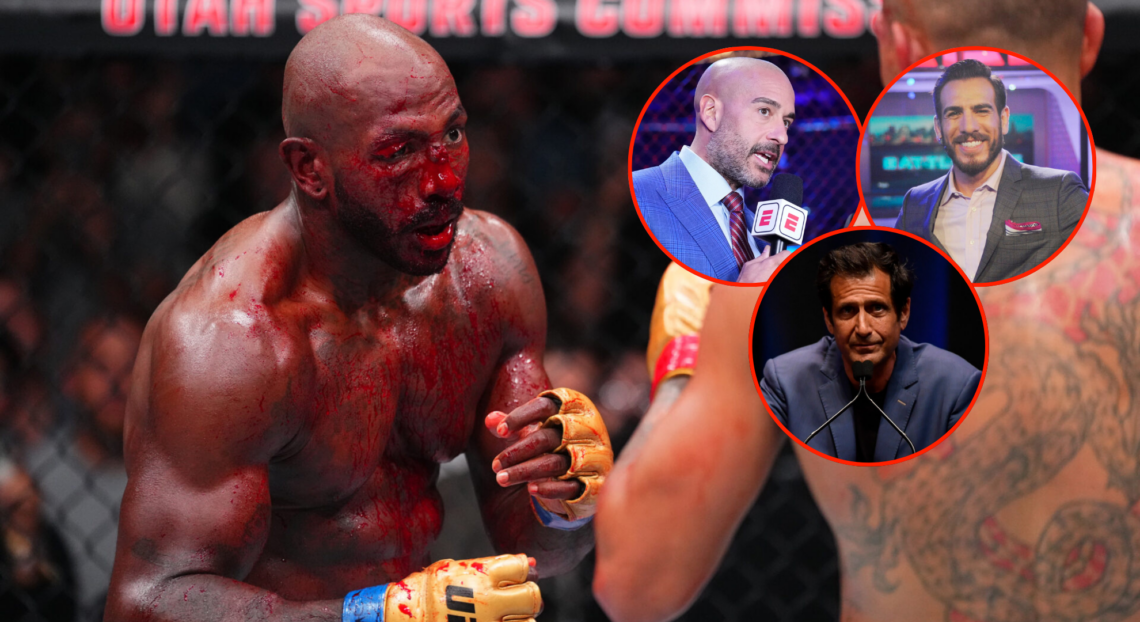Across the countless MMA promotions worldwide, there’s no shortage of examples from when fans and fighters have been furious that a referee has waved off a bout before an athlete was ready to call it quits.
But what happens when the opposite occurs and the delayed decision causes extra damage to be inflicted – is there a trend in the modern MMA game where referees are now allowing fights to go longer, for the benefit of fans, and at the detriment of those athletes involved?

UFC experts debate the trend over referees allowing fights to go longer
At UFC 307, light heavyweight champion Alex Pereira put a beating on Khalil Rountree Jr, with ‘The War Horse’ sustaining a brutal amount of damage before finally being put away in the fourth round.
Whilst most UFC fans were content with the stoppage, the finish has spawned an interesting conversation regarding whether referees are allowing fights to last longer than they otherwise should.
On this week’s episode of the Anik and Florian Podcast, the conversation shifted to that trend; with veteran coach Ray Longo first noting how MMA referees often find themselves having to make difficult decisions on fighter safety, against what the fighters themselves want.
“Anytime your error is on the side of safety, you sometimes can have a problem [with that], but if your heart’s in the right spot and you don’t want to see somebody get hurt or you think they’re taking too much damage, that’s where it becomes tricky.
“A lot of guys want to go out on their shield, and I understand that, but we’ve seen time and time again, guys who are just too tough for their own good and they take that extra beating.”
Longo pointed to the recent LHW title fight as a recent example, claiming Khalil Rountree Jr would have likely eaten five or six more heavy strikes to the head, had the body shots not dropped him first.
- WATCH: Ariana Grande promote UFC 308 in parody song that takes indirect aim at Rogan, Anik, and more
“Like Khalil at the end of that fight, he [Pereira] had to get those body shots to go down, like that guy’s noggin was holding up to everything and those were big shots… I think he would have stood up for another five or six of those [head shots] – I don’t think that would have been smart either.”
Voice of the octagon Jon Anik would acknowledge how “That’s when professional boxers suffer real harm,” as he offered his thoughts on the issue at hand in MMA.
“I do think that there is a trend amongst referees that is more towards allowing fights to go long, especially in high-profile settings, as opposed to stoppages that are not so much worried about bloodsport or crowd, that is really rooted in fighter safety.”
Whilst Anik didn’t go as far as to say that referees were intentionally allowing fights to go longer in the face of unrelenting damage, “We’re certainly trending away from that” early stoppage scenario.
Former UFC fighter Kenny Florian agreed that the trend is of concern, as he instead looked to offer an explanation from a fighters’ and coaches’ perspective.
“It’s always really hard to find that fine line; am I giving too much [damage away] to the point where we’re going to get a loss anyway? And if we’re going to get a loss anyway, am I taking away from my future ability to be better?
“That’s what we should be managing; if I continue on with this fight and I show that warrior spirit, am I now 20% less capable for my next few fights.”
Longo, who has helped coach countless athletes to world title success, would put one final point on the conversation regarding early vs late finishes we’ve seen of late.
“I don’t want to get into it today, but the CTE thing is pretty brutal, it’s got to be managed properly [where] everyone knows what they’re getting into, and everyone knows the side effects that can happen when you make that decision.”

